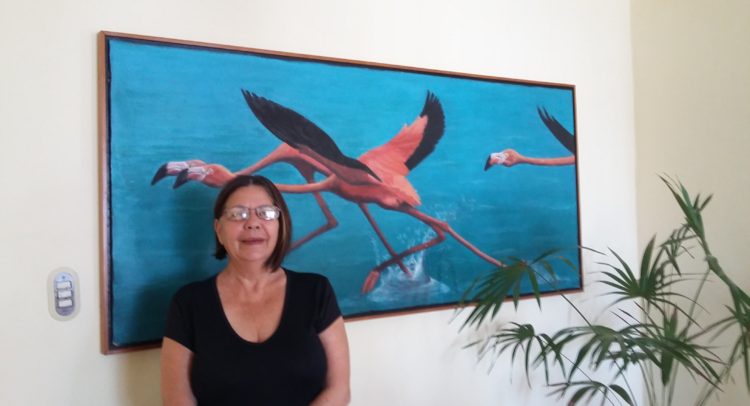TEXT AND PHOTOS BY ROBERT ADAMS //
Dr. Xiomara Gálvez may not be a typical Merida “expat,” but she certainly is one of the most accomplished and interesting members of Yucatan’s international community.
After a 30-year career as a research scientist and director of endangered birds for Cuba’s Empresa Nacional para la Protección de la Flora y Fauna (National Agency for Protection of Plants and Wildlife), Gálvez retired in 2006 to Cancun with the idea of enjoying a life of relaxation.
But when she moved on to Merida in 2009, her lifelong interest in tropical birds led her to begin studying the endangered Yucatan flamingo. In Cuba, Gálvez’s primary research work had been preservation of coastal habitats of birds like the flamingo, sandhill crane, Cuban parrot, woodpecker and hawk.
Soon, she was again writing and publishing scientific journal articles – now with birdlife in Yucatan instead of Cuba as the focus – as well as plunging into simultaneously writing two books, one on flamingos and another on cranes.
“The flamingo is a symbol that connects the entire Caribbean region,” Gálvez commented in an interview at her Merida home. This quiet residence also serves as the headquarters of the Caribbean Coast Conservancy, a non-profit organization founded in 2016 to preserve the flamingo in the 10 Caribbean countries that share the species.
“But the flamingo here in Yucatan and elsewhere is in a very difficult situation – what we call a ‘false abundance’. People don’t understand the dangers they are facing in their few areas of reproduction. They really are an endangered species.”

The interconnectivity of the Caribbean region that fascinates Gálvez has been demonstrated by a flamingo-banding project she has undertaken in Yucatan. She said flamingos banded in Yucatan have been sighted in far-flung locations such as Texas, Florida, Cuba, Grand Cayman and beyond.
Besides working for plant- and wildlife conservation through her research and writing, Gálvez has been active in promoting a 400-hectares nature reserve in the Komchén community just north of Merida.
Called Komchén de los Pajaros (Komchén of the Birds), the reserve is intended to provide a peaceful private retreat and conservation area in the fast-developing urbanization of Merida.
“The area was originally a henequén plantation that had been abandoned, but it was preserved in the jungle by its current owner for 30 years,” Gálvez noted while proudly displaying photos of the cabañas and other buildings that have been restored at Komchén. The cabins are available for rental through AirBnB and other booking platforms. Funds obtained from rentals are used to sustain the protected area.
In addition to her work on behalf of conservation, Gálvez is passionate about promoting “low-impact” tourism for Yucatan. “We still have time in Yucatan to preserve the environment while developing sustainable tourism,” she commented.
Continuing, Gálvez noted that Yucatan should learn from mistakes made in nearby Quintana Roo. “Cancun and other areas have already lost the possibility of eco-tourism. There the ‘sun and sand’ tourism is aggressive, non-environmentally friendly.
“Yucatan can still have a thriving tourism industry based on nature and culture,” she emphasized.
In her wide-ranging travels for research and scientific conferences – she has visited 28 countries – Gálvez has witnessed many examples of what she considers both good and bad tourism industries. Among the most positive role models for Yucatan she believes are Costa Rica and her native Cuba. There, she said, the tourism industry is committed to working with local communities in sustaining the environment and providing a portion of revenues for conservation.
For more information on Komchén de los Pajaros and the Caribbean Coast Conservancy, visit www.komchen.com, email xiogalveza@yahoo.com.mx or telephone 999 152 5917 (cellular).
–By Robert Adams










